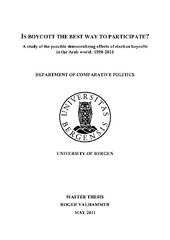Is boycott the best way to participate ? A study of the possible democratizing effects of election boycotts in the Arab world: 1990-2010
Master thesis
Permanent lenke
https://hdl.handle.net/1956/4924Utgivelsesdato
2011-06-01Metadata
Vis full innførselSamlinger
Sammendrag
This thesis aims to determine if election boycott is a sound strategy if the opposition in Arab states aspires democratization. No scholars have conducted research focusing on this specific subject up to date, despite the recent increase in the numbers of parliamentary elections being boycotted in the Arab region. The general research question is: What are the democratizing effects of opposition boycott of parliamentary elections in the Arab world?" Studies on election boycotts do not abound, but generally speaking, there are two opposing camps. On the one hand, one finds those scholars who support the arguments following Staffan I. Lindberg's theory of democratization by elections. On the other hand, there are those who argue for the possible democratizing effects of certain types of boycotts, namely major boycotts. Based on the fact that the Arab world evidently has not democratized due to the various regimes' electoral openings, I anticipated democratizing effects of major boycotts. In order to identify possible boycott effects on the democratization process in Arab states, the thesis employed the method of comparative historical analyses, including both qualitative and quantitative approaches, to test possible effects on specific democratizing variables. The analyses were conducted utilizing both quantitative and qualitative data, including my own collected data, Judith Kelley's dataset, monitor reports as well as other secondary sources. The quantitative results showed that there were no democratizing effects from minor election boycotts or election boycotts in general, while there were positive correlations between major boycotts and some of the dependent variables. The likelihood for causal correlations, however, was weakened by the qualitative study. The qualitative analyses indicate that if major boycotts have effects, it is in interaction with other more important contextual factors. These findings are also strengthened by the strong correlation between non-hegemonic regimes and the effect of boycotts. However, these results are tentative, and cannot be confirmed without more extensive research. In conclusion then, this thesis suggests that the democratizing potential of boycotting parliamentary elections in the Arab world is not substantial, although possibly higher when major boycotts are interacting with other crucial external or internal contextual variables.
